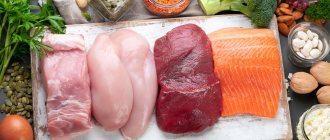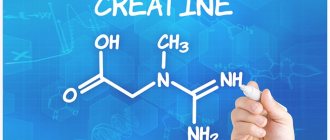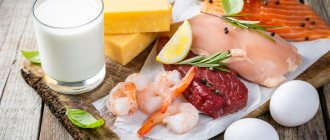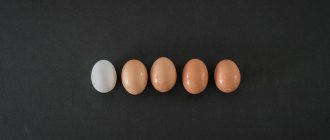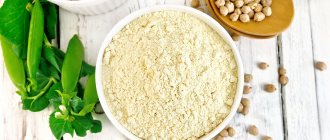Protein is every bodybuilder's favorite nutrient—and for good reason. Protein is very important, super filling and fantastically anabolic. Protein is amazing... but you're probably consuming too much of it.
Like most myths, the belief that you need to consume 1 g/lb (~2.2 g/kg) of body weight has become so pervasive in the fitness world that its validity is rarely challenged. Surprisingly, very few people think about the somewhat strange fact that the optimal amount of protein our bodies can absorb in a day is exactly 1 g/lb. But is it? Let's take a look at the scientific literature on the effects of daily protein intake and see if consuming 1 g/lb (2.2 g/kg) is really the optimal amount for maximizing muscle gains.
Research on Optimal Protein Intake
All values in the list of studies below are expressed in grams of protein per pound of body weight per day. All studies controlled energy intake either on the basis of individual requirements or with energy intakes set to be equivalent across all experimental conditions, with differences between groups only in the proportion of protein. If experiments relied on unreliable methods, such as nitrogen balance as a proxy for changes in lean body mass, I included them as long as sweating and dietary adjustment were controlled:
- In 1992, Tarnopolskyetal found no differences over a two-week period in total body protein synthesis or lean body mass index in strength athletes consuming 0.64 g/lb (1.4 g/kg) or 1.10 g/lb (2. 42 g/kg). Protein oxidation increased in the high protein intake group, indicating nutrient overload.
- In 1988, Walbergetal reported that 0.73 g/lb (1.6 g/kg) was sufficient to maintain positive nitrogen balance in weightlifters over a one-week weight loss period.
- In 1988, Tarnopolskyetal found that only 0.37 g/lb (0.8 g/kg) was required to maintain positive nitrogen balance in high-level bodybuilders (5 years of training, possible prior androgen use) for 10 days. .45 g/lb (0.99 g/kg) is sufficient to maintain lean body mass for more than 2 weeks. The authors note that for bodybuilders, 0.55 g/lb (1.2 g/kg) is sufficient.
- In 1992, Lemonetal found no difference in gains in strength and muscle mass in novice bodybuilders consuming 0.61 g/lb (1.34 g/kg) or 1.19 g/lb (2.6 g/kg) for 4 weeks. ). Based on nitrogen balance data, the authors recommend 0.75 g/lb (1.65 g/kg).
- In 2006, Hoffmanetal found no differences in body composition, strength, or resting hormone concentrations among strength athletes consuming 0.77 g/lb (1.7 g/kg) or >0.91 g/lb (2.0 g) /kg) for a period of 3 months.
So, there are some long-standing studies based on nitrogen balance that suggest (but never find) a benefit from high protein intake, but as I mentioned above, these studies had methodological inaccuracies. Nitrogen balance is a notoriously unreliable method for assessing changes in lean body mass, especially high values, and these experiments did not control for sweating or dietary adaptation. Significant changes in dietary protein intake are known to result in a negative nitrogen balance 2 weeks after the change, even in the case of significant protein and energy intake. Additionally, these studies did not exclude users of androgenic anabolic steroids, although they were conducted on competitive athletes (Tarnopolskyetal, 1988). Unsurprisingly, many of these studies are not translated and remain obscured in abstract form on PubMed, if they appear there at all.
The Bayesian bodybuilder tramples methodological errors into the ground.
Based on the studies discussed above, many reviews have concluded that 0.82 g/lb (1.8 g/kg) is the upper limit of the benefits of protein intake on body composition (Phillips & Van Loon, 2011). These recommendations often include a double 95% confidence level, meaning they took into account the highest mean intake at which benefits were observed and then added two standard deviations to that level to be absolutely certain of the maximum benefit from additional protein intake. Thus, consuming 1 g/lb (2.2 g/kg) is a pointless oversafety, since 0.82 g/lb (1.8 g/kg) is already very safe.
The figure below summarizes the literature. As you can see, 1.8 g/kg (0.82 g/lb) is the point beyond which there is no benefit from consuming additional protein.
RDA – recommended daily allowance; SV - athletes in endurance sports; SS – athletes of power sports.
Protein in bodybuilding
Proteins are our building material... without it, muscle growth (as I said earlier) is impossible.
The body needs it to build new muscle cells (muscles) and heal (restore) old ones, which are regularly (after all, we train not once a month, but almost every day, day after day) are injured during training.
Protein is the main substance in the body, after water.
Protein is used to build muscles, skin, hair, organs, and nerves. It is present in hormones, enzymes, and blood.
The amino acid composition of a protein is completely determined by 20 amino acids (9 of which are non-essential, i.e. they are not synthesized by the body itself, and 11 of which are replaceable):
- Replaceable: alanine, argenine, asparagine, aspartic acid, glycine, glutamine, glutamic acid, proline, serine, tyrosine, cystine.
- Essential: leucine, isoleucine, valine, lycine, histidine, methionine, threonine, tryptophan, phenylalanine. <= these amino acids must necessarily come from outside with food (since the body itself does not synthesize them). This is a very important point... a lack of essential amino acids can cause delays in human development, let alone bodybuilding, where we can confidently say that a lack of essential amino acids will not allow the potential of development and improvement of the body to be realized.
The optimal ratio of essential amino acids differs for each person, because... it depends on gender, age, lifestyle and other characteristics of a particular organism.
But in general, the following ratio of 1000 mg of protein is considered optimal for an adult male:
- Isoleucine – 40 mg
- Leucine – 70
- Lysine – 55
- Methionine + cystine – 35
- Phenylalanine + tyrosine – 60
- Tryptophan – 10
- Threonine – 40
- Valin – 50
In general, the most important amino acids for the body (body) from a metabolic point of view are: leucine, isoleucine and valine.
All three amino acids are representatives of the so-called BCAA class, and for those who are not in the know, BCAA amino acids play an important role in protein metabolism and the energy component of muscle work.
That’s why, for optimal protein synthesis processes, all three amino acids must be included in the human diet (either through natural products or with nutritional supplements).
But I'm more prepared than these guys!
Another opinion that is often heard is that people need more protein because they are more experienced than the study population. Well, Tarnopolskyetal (1988) used experienced bodybuilders and found that they needed less protein than beginners.
In fact, several studies have suggested that the more experienced you are, the less protein you need (Rennie & Tipton, 2000; Hartman, Moore & Phillips, 2006; Moore et al., 2007).
Every person constantly undergoes protein synthesis and breakdown. Weight training leads to an increase in breakdown and synthesis, normally the balance shifts towards synthesis. As your training progresses, your body becomes more effective at inhibiting protein breakdown due to training. Therefore, less and less protein is required for recovery, this increases nitrogen retention, which means less protein is subsequently needed for optimal growth.
In addition, the more you train, the less protein synthesis increases after exercise. As you become more muscular and closer to your genetic limit, less muscle is built after exercise. It's intuitive. The less muscle you can build, the less protein you need for optimal growth. It wouldn't make any sense if the body needed more protein to build less muscle, especially since the body metabolizes protein more efficiently.
Ratio of animal and plant proteins
The classic ratio of animal and plant proteins in sports nutrition is 60% and 40%, respectively. During competition periods, the proportion may change and the share of animal proteins will increase to 80%, and the share of plant proteins will decrease to 20%. This change is due to several factors:
Proteins of animal origin contain all the necessary amino acids and are almost completely absorbed by the body, so their presence in an athlete’s diet is mandatory. Egg whites (quail and chicken eggs are recommended), milk and whey proteins are best absorbed. Cheese and cottage cheese take second place, while white poultry and fish share third place.
Proteins of plant origin do not contain all the necessary amino acids, are digested worse than animals, and require additional energy consumption for the digestion process. At the same time, the consumption of plant protein foods is necessary in the normal training regime - it is rich in fiber, complex carbohydrates, micronutrients, and healthy fats. Such products help lower blood cholesterol, control weight, and promote a quick feeling of fullness. The best sources of vegetable protein for athletes are legumes, soybeans, and nuts.
What about during the period of weight loss?
The last argument that is often heard is that the value may be appropriate during the period of gaining or maintaining muscle mass, but when losing weight, more protein is required to maintain muscle mass. Walbergetal (1988) studied weightlifters during weight loss and concluded that 0.73 g/lb (1.6 g/kg) was sufficient to maintain lean body mass.
Perhaps even more revealing is the 2008 Pikoskyetal experiment. The researchers recruited a group of endurance athletes and asked them to consume 0.41 or 0.82 g/lb (0.9 or 1.8 g/kg) of protein per day. They also reduced their intake by 1,000 kilocalories during their peak training periods. So these guys were literally running at a 1000 calorie deficit while dramatically increasing their training volume. Talk about a catabolic state... Of course, the nitrogen balance in the low protein group became dramatically negative. However, a protein intake of 0.82 g/lb (1.8 g/kg) in the other group completely protected subjects from muscle loss. Nitrogen balance, general metabolism in the body and protein synthesis remained unchanged.
A more detailed review of the literature on optimal protein intake under energy deficit conditions can be found
The estimated differences in the nitrogen-sparing effect of carbohydrates and fats are also small (McCargar et al. 1989; Millward, 1989). Although in fact protein is not saved. Only protein saves protein. I believe the idea of protein conservation comes from a misinterpretation of scientific data on nitrogen balance showing greater muscle loss with a larger calorie deficit. A simple explanation for these findings is that the more total body mass you lose, the greater the decrease in lean mass. Nothing surprising.
Thus, there is simply no empirically based reason to believe that we need to consume more than 0.82 g/lb (1.8 g/kg) during weight loss. In any case, it is reasonable to assume that the body can use more protein during the period of mass gain, as more muscle is built and many other nutrients are consumed, which makes it possible to utilize more protein.
People who may actually need more protein than 0.82 g/lb (1.8 g/kg) include those starting out or having unusually high levels of anabolic hormones. Androgen or growth hormone users certainly fall into this category, and I would not rule out a similar possibility for some teenagers. If you have reached peak testosterone production during your growth period (height), unusually high testosterone and growth hormone levels may increase your protein needs. Or not. There are no studies that confirm this. Those rare people with a fantastic genetic predisposition for bodybuilding may also need it, but unless your father just happened to be a silverback gorilla, then it's more likely that your needs are similar to other people.
How many carbohydrates do you need for muscle growth?
General recommendations are 4.4-6.6 grams of carbohydrates per kilogram of body weight. Here again, there are those who achieve better results on high carbohydrates, and there are those who do not tolerate large amounts of carbohydrates well.
There are two variables that influence carbohydrate intake here: training volume and insulin sensitivity.
Training Volume
Volume is the total number of approaches per workout. For example, each exercise consists of three approaches. If you have eight exercises in the program, your training volume is 24 sets.
It is very roughly calculated that for every 2 approaches the body spends 5 grams of carbohydrates. If your workout has a total of 24 sets of all exercises, the body spends 60 grams of carbohydrates on them, which must be replenished with food (24 sets * 5 g/2 sets). This figure is not a strict guide to action, but it shows that a huge amount of carbohydrates is not required to gain muscle unless a person does several dozen sets per workout.
Insulin sensitivity
Insulin sensitivity measures how well muscle cells respond to insulin and take glucose from the blood. Genetic sensitivity to insulin can vary up to 10-fold from person to person. When we talk about good genetics for bodybuilding, this is also what is meant.
So people with good insulin sensitivity can afford more carbohydrates in their diet and can more effectively store carbohydrate calories into muscle rather than fat. People with poor sensitivity should eat fewer carbohydrates. This way, they not only feel better, but also grow better, without adding a lot of fat in the process of gaining muscle.
How do you know how sensitive you are to insulin?
You can try an experiment or remember:
1. What did you notice after eating a high carbohydrate meal? It is important to choose foods without fat: muffins and sweets are not suitable. Pasta, rice, potatoes, bananas, bread are fine.
- a) muscle fullness and better relief. This may indicate good carbohydrate tolerance.
- b) heaviness, fullness and swelling. This is not good carbohydrate tolerance.
2. After eating a lot of carbohydrates, you feel:
- a) vigor, energy, burst of strength. This means you have normal levels of insulin secretion.
- b) loss of strength, drowsiness and rapid hunger after an hour. Perhaps insulin secretion is increased. This causes your blood glucose to drop sharply, making you sleepy and hungry.
Strength training increases muscle sensitivity to insulin. This is the most powerful tool we can use. But for people with poor sensitivity, carbohydrates should still be kept in moderation even during the muscle growth phase. In this case, 150 grams of carbohydrates per day may be sufficient (this is not the weight of cereals, but the weight of carbohydrates). The remaining calories come from protein and fat to normal levels.
Myth Source 1 g/lb (2.2 g/kg)
Why then does everyone say you need to consume 1 g/lb (2.2 g/kg)? Aside from the facts, which do not provide any good reason to believe the myth, there is a tendency for myths to be perpetuated through conformity and tradition, and the fitness industry is inundated with myths, here are some plausible reasons for confusion:
- People imitate the eating habits of androgen-fuelled bodybuilders. Steroids allow you to absorb much more protein than you normally can.
- People are basing recommendations on flawed nitrogen balance studies from a time when the world was still flat.
- Heuristic, the more the merrier. There is so much research showing the benefits of protein for you that it's hard not to think more is better.
- Supplement companies have a very clear financial incentive to promote the belief that you need more protein than you actually do. There are several industry-sponsored studies showing the absolutely miraculous benefits of consuming more protein (check out the Cribb studies for an example).
- People don't want to mess with decimal numbers and simply round to the nearest convenient whole number, which is what happens with the easy-to-remember number 1.
More is often better, but in some cases it's just overkill.
One final note, there is nothing wrong or unhealthy about consuming more protein than your body can use to build muscle. The excess will simply be used as energy. However, protein sources tend to be more expensive than other energy sources and variety is preferable to your health, so satiety and dietary preferences are the only reasons I would want to consume protein excessively.
Functions of protein (protein)
In fact, proteins (proteins) have two main functions: the first is to supply the body with building material for the synthesis of new protein molecules (new muscles) and the second, to supply the body with energy (a source of calories).
However, this is if we consider it from the point of view of bodybuilding, and if in general, then protein has many functions, see the full list below in the table:
Helpful information
- Normally, there is no benefit from consuming more than 0.82 g/lb (1.8 g/kg) of protein per day to prevent muscle loss or gain after the initial training period or for training without steroids. This value is a bit of a stretch, as most studies have found no benefit from intakes above 0.64 g/lb (1.4 g/kg).
- Optimal protein intake decreases with training experience, due to increased effectiveness in preventing protein breakdown from training and lower protein requirements due to the reduced amount of muscle you can build after each session.
Source:
Classification of protein (protein)
By degree of digestibility:
- Fast, i.e. protein is very quickly absorbed by the body, for example: fish, eggs, seafood, whey protein.
- Slow, i.e. on the contrary, protein takes a long time to be absorbed by the body. An excellent example: cottage cheese (it is a “long-lasting” protein, because it consists of 70% casein) or casein protein from sports nutrition (or as it is also called, long-lasting or night protein).
- Complex is a mixture of different types of protein, namely: whey + casein (fast + long-lasting), it works as follows: provides a peak concentration of amino acids shortly after intake (whey), while at the same time slowly digestible proteins (casein) provide long-lasting muscle nutrition.
According to amino acid composition:
- Full-fledged;
- Inferior;
- Simple - consist only of amino acids;
- Complex – composed of an amino acid + a non-amino acid residue (complex with lipids, carbohydrates).
By degree of solubility:
- Soluble (i.e. form colloidal solutions) in water;
- Insoluble in water (i.e. they do not form colloidal solutions).
Causes of protein deficiency
One of the reasons for the lack of protein in the diet of athletes is vegetarianism. Plant proteins are not able to provide an athlete with a complete (in terms of qualitative and quantitative characteristics) complex of amino acids. Vegetarian athletes are recommended to eat eggs and dairy products, as well as, under the supervision of a doctor, special protein complexes.
Lack of protein in athletes may be associated with the quality of protein products and methods of their heat treatment. The nutritional value of frozen products stored for a long time using preservatives that have undergone long-term heat treatment is reduced by approximately 40% compared to fresh products that have undergone the minimum necessary culinary processing.
Expert: Galina Filippova, general practitioner, candidate of medical sciences Author: Natalia Bakatina
The material uses photographs belonging to shutterstock.com


